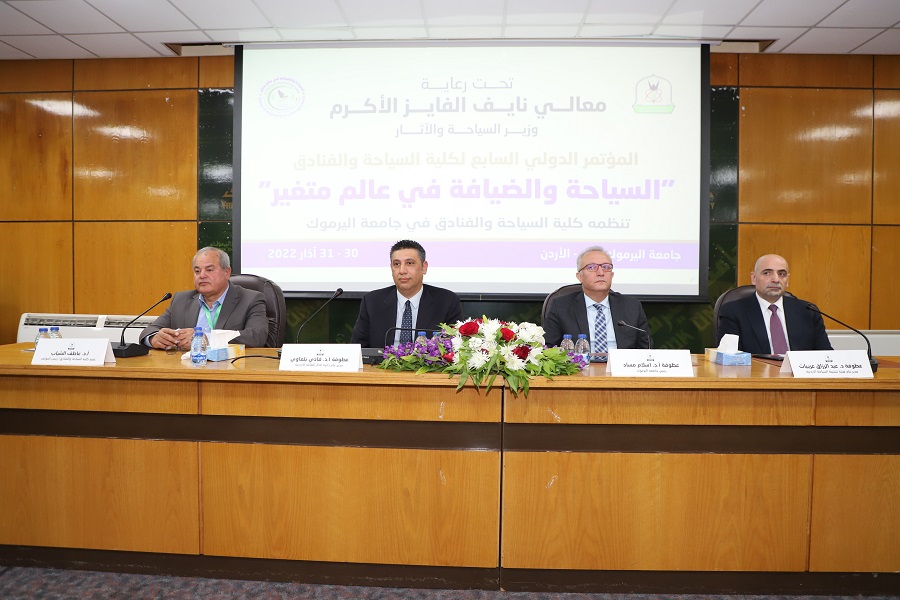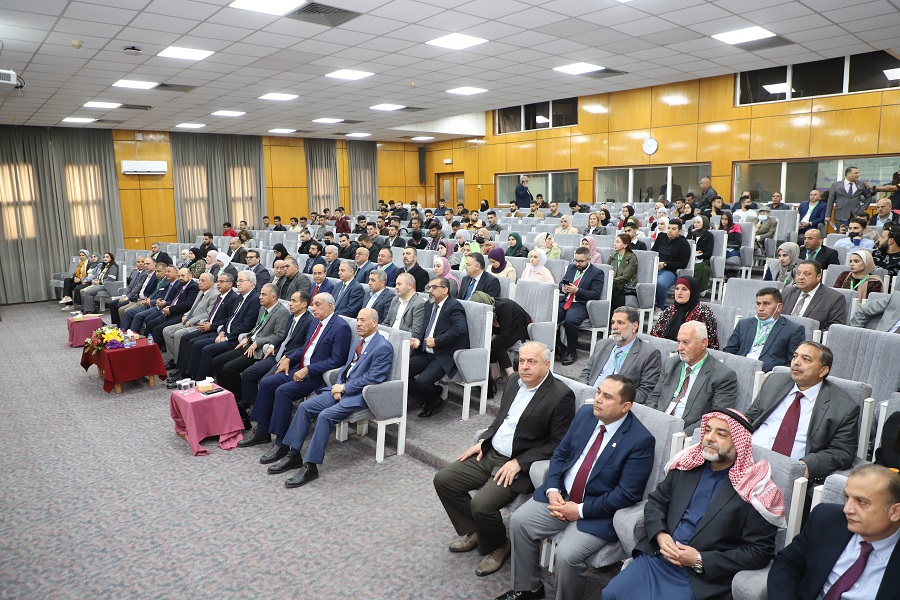
In the presence of the Chairman of the University’s Board of Trustees, Dr. Khaled Al-Omari, the University President Professor Islam Massad, and the General Director of Jordan Tourism Board, Dr. Abdul Razzaq Arabiyat, the General Director of the Department of Antiquities, Dr. Fadi Al-Balaw, representing the Minister of Tourism and Antiquities patronized the opening of the activities of the seventh international conference of the Faculty of Tourism and Hotels at Yarmouk University entitled “Tourism and Hospitality in a Changing World”. The conference, which was attended by researchers from Kuwait, Saudi Arabia, UAE, Pakistan, India, Germany, Britain, Malaysia, Spain, Italy, Romania, and Jordan, included working sessions where several papers were presented and discussed by researchers.
In his speech, Al-Balawi stressed the importance of the conference, as it sheds light on one of the most important economic resources of Jordan, namely the tourism sector. He explained that this sector constitutes a great source of employment and economic growth for Jordan has more than 15,000 important archaeological sites. However, pointing out the hardships of the sector during the past two years, Al-Balawi reviewed the main elements contained in 2020 policy brief of the United Nations concerning manipulating, preserving, and restoring the tourism sector all over the world. He then concluded that the future of tourism in Jordan seems to be much better than now, considering that the statistics of today are greater than what is listed in the strategy of 2001.
In his turn, Massad welcomed the conference participants at Yarmouk University, emphasizing the uniqueness of the university in terms of authenticity and heritage, as it derives its name and legacy from the historical Battle of Yarmouk. He then celebrated the geographical uniqueness of Jordan and its cultural and civilizational roots, stressing that tourism and hospitality are two main pillars of economic and social development in both industrialized and developing countries. He continued: “The Faculty of Tourism and Hotels is always distinguished for its great contribution to creating the concept of professional change by qualifying and developing cadres required for tourism and hotels away from traditional education".
For his part, Arabiyat affirmed that Jordan's economic future depends on tourism, as the country is rich in tourist and archaeological sites. He stressed the need for developing the management of the tourism sector, maintaining and protecting archaeological and tourist sites, and providing tourists with services that meet their expectations. Thus, he called on students of the faculty to work on creating innovative plans to find beneficial solutions for the problems of the tourism sector. He also stressed the need to create new tourist experiences based on the interaction of tourists with the local community.
The Dean of the Faculty of Tourism and Hotels, the conference’s president, Dr. Atef Al-Shayyab, pointed out that Jordan is rich in its tourism resources and is characterized by its strategic location, describing the country's tourist sites as “Jordan’s oil”. He suggested, if tourist sites are rehabilitated, preserved, maintained, restored, and managed in an attractive scientific manner, then that will increase the gross national income, and revenues of the tourism sector will increase, which will help in solving Jordan's financial problem. Then he added: “we are meeting in this conference to discuss the latest developments in the tourism and hospitality sector considering the changes witnessed in recent years at the local, regional, and international levels, and to review the future trends of such sector, including dealing with crises and the use of modern technology.




